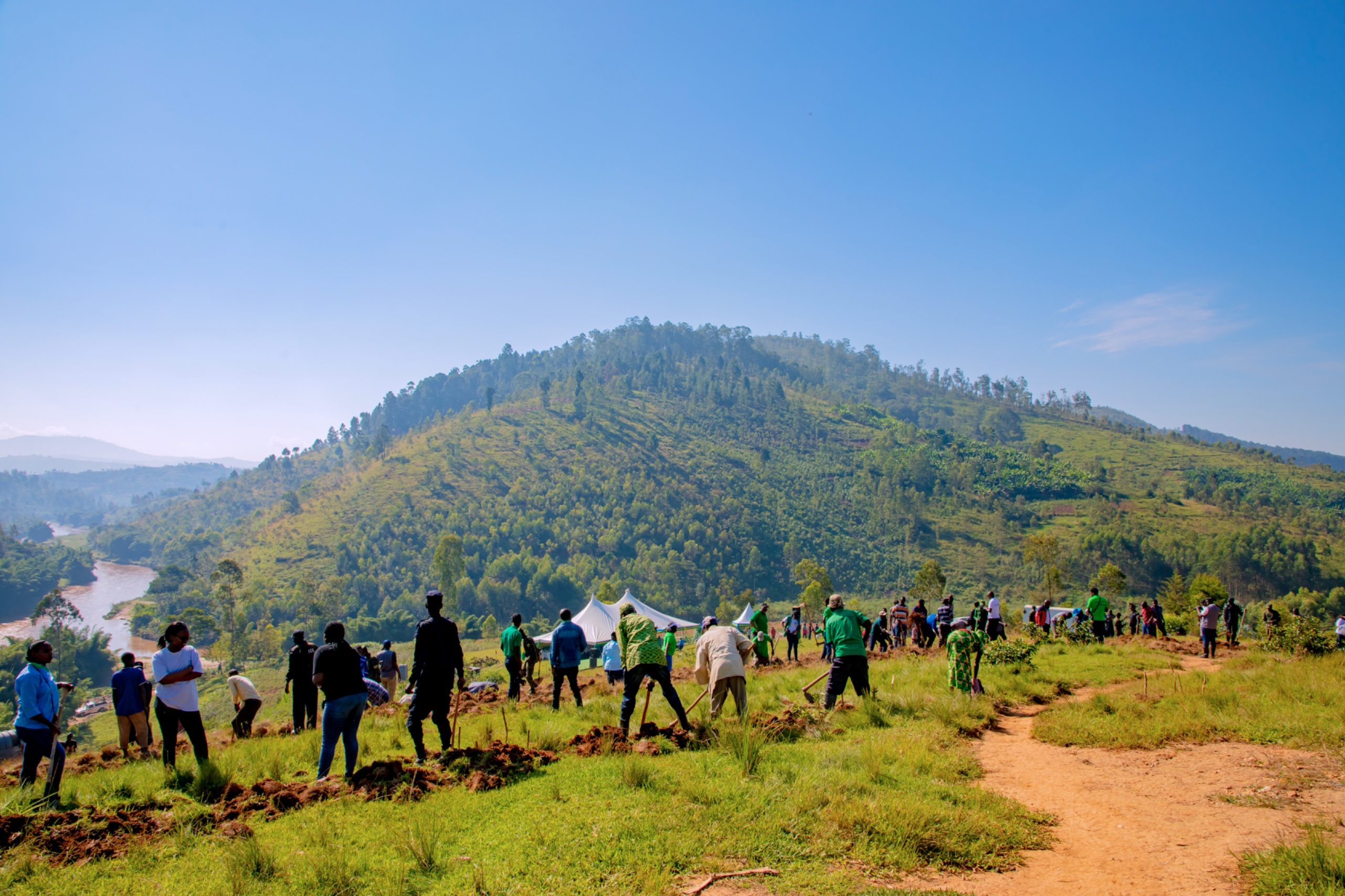By Bernadin Uzayisaba

During umuganda, creating terraces at Nyabikono site , upper catchement of Nyabarongo river.
In honour of World Environment Day 2024, themed "Restoration, Desertification, and Drought Resilience," here we highlight Rwanda's efforts to protect natural resources and combat climate change. Through political leadership, strategic partnerships, and effective policies, Rwanda's 30-year journey serves as a valuable example that safeguarding natural resources and combating the devastating effects of climate change is within reach.
This journey has been driven by necessity. Following the heavy reliance on its natural resources that resulted to soil erosion, land degradation and deforestation, Rwanda lost over 65% of its forest cover between 1956 and 1996. Through embracing innovative practices that prioritize the well being of its citizens, Rwanda has successfully restored many of its degraded ecosystems such as wetlands, forests, and biodiversity, thus achieving its goal of 30.4% forest cover since 1994.
In my role leading the Sustainable Growth portfolio at the United Nations Development Programme in Rwanda, I have worked closely with partners in government and civil society in developing environmental policies and implementing programs. Through this experience, I believe that Rwanda’s success rests on three pillars:
1. Strong Institutional and Policy Framework
Since 1994, Rwanda has developed strong institutions and long-term policies to harness natural capital for sustainability. In 2005, Rwanda established the Rwanda Environment Management Authority (REMA) to oversee environmental management practices. It operationalised the Rwanda Green Fund (FONERWA) in 2012, to mobilize funds for green projects, promote climate resilience and low-carbon development. So far, $247million has been mobilized, with 46 projects supported, creating 176,000 green jobs.
From 2008 to 2018, environmental and climate considerations evolved from being an annex in the Economic Development and Poverty Reduction Strategy (EDPRS I and II) to becoming central in the National Strategy for Transformation (NST1) and Vision 2050. In 2011, Rwanda adopted the National Green Growth and Climate Resilience Strategy (GGCRS). UNPD supported its revision in 2023 and worked with the country to develop key instruments like climate budget tagging and green village toolkit to implement its Nationally Determined Contribution (NDC), while realising the SDGs.
Furthermore, the UNDP supported Rwanda in setting climate finance mechanisms, including the launch of the Green Investment Facility "IREME Invest" in 2022 and the Carbon Market Framework in 2023.
2. Strategic Partnerships
Rwanda is the first government to be accredited by the Green Climate Fund (GCF) and access GCF resources to restore the degraded hills and valleys in Gicumbi. Rwanda also joined the Partnership for Action on Green Economy (PAGE) in 2022. Partnering with PAGE helps Rwanda accelerate the implementation of Vision 2050, aiming to become an upper middle-income country by 2035 and a low carbon, high-income country by 2050.
UNDP supports Rwanda in its endeavours to tackle climate change and protect the environment to improve the livelihoods of its citizens. We have deeply invested in strengthening both individuals and institutions, equipping them with the knowledge and tools necessary to adapt to changing climate. Our collaboration extends to the formulation and implementation of robust policies and institutional frameworks that attract funding for environment-friendly projects that support continuous development.
With partnership with other UN agencies like FAO, UNICEF, WFP, UNIDO and UNHabitat, UNDP has piloted climate proofed rural settlement and supported innovative initiatives like green villages, clean cooking energy solution and vertical farming practices.
3. Community Engagement
Rwanda’s approach to environmental sustainability has been deeply rooted in community ownership and engagement, recognizing that lasting environmental change requires citizen participation. A prominent example is Umuganda, a monthly event where citizens and their leaders engage in community service projects like tree planting and land rehabilitation, to nurture community spirit and promote environmental stewardship.
The concept of green villages is another innovative approach. The government funds construction of these villages, which use renewable energy, emphasize efficient water use, and promote sustainable agriculture and waste management.
The government also collaborates with NGOs and international partners to support community-based conservation projects, like the Akagera Conservation Project. It involves local communities in protecting wildlife and managing natural resources in and around Akagera National Park.
Rwanda invests in environmental education and youth engagement programs in schools and universities through programs like the Rwanda Youth Volunteers in Community Policing (RYVCP), integrating environmental protection into their community service.
Looking ahead!
On 25th May 2024, Rwanda started a week-long national environment campaign with special ‘Umuganda’ activities centred on restoring ecosystems and combat soil erosion in various corner of the country. This activity brought together ministers, government officials, development partners, military, police, NGOs, private sector, civil society organisations, and youth showcasing Rwanda's united front in pursuit of sustainable development.
Rwanda is determined to stop the environment degradation while building its people’s adaptation capacity, a goal shared by all - citizens, partners and government entities. The country is making investments in renewable energy solutions to decrease reliance on biomass for cooking, thereby curbing deforestation and indoor air pollution. It also promotes sustainable agricultural practices and land management techniques and prioritizes green urban planning and infrastructure development.
By prioritizing these actions and fostering collaboration, Rwanda can continue to make significant strides towards achieving its sustainable development goals and securing a brighter, more resilient future for its people and the environment.
Bernardin Uzayisaba leads the Sustainable Growth team at UNDP Rwanda and is an expert on environmental sustainability and climate solutions.

 Locations
Locations



